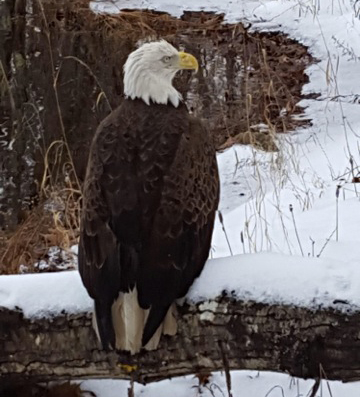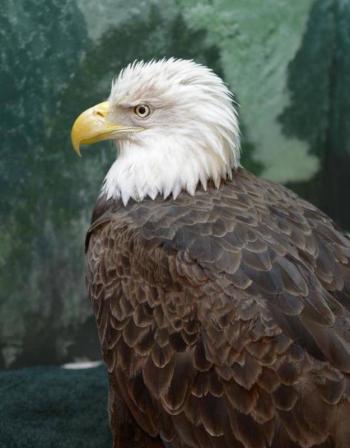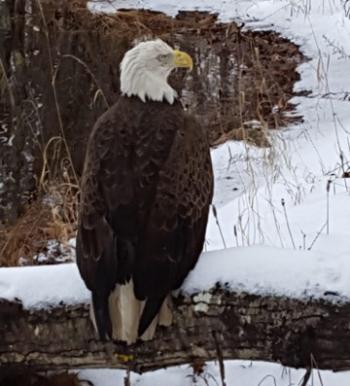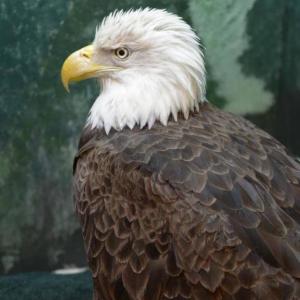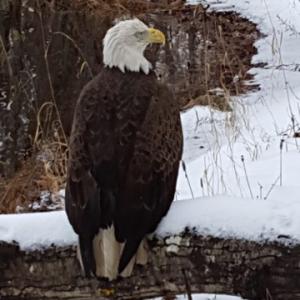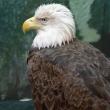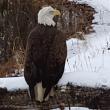Knox County Sheriff's deputy, Avian Haven volunteers rescue bald eagle suffering from lead poisoning
FREEDOM — Avian Haven, a hospital for birds and turtles in Freedom, admitted its first creature of 2016, a distressed bald eagle that had been rescued in Union on New Year’s Eve. The eagle suffers from lead poisoning, and whether it survives remains unclear.
“Eagles are exquisitely sensitive to tiny amounts of lead,” said Diane Winn, of Avian Haven, on Jan. 5.
The eagle likely ingested lead bullet fragments while scavenging dead animals shot by hunters.
Knox County Sheriff's Deputy Nathaniel Jack said he came across a bald eagle in distress near Ayer Park, in Union. Ayer Park sits on the shore of Seven Tree Pond.
“While traveling by Ayer Park in Union I observed a bald eagle acting oddly,” he wrote in his report. “The eagle appeared injured. I called dispatch and asked them to call the Maine Warden Service and advise them of the injured eagle.”
Jack said the eagle was acting strangely and when attempting to fly, she instead went head first into the water.
Nearby citizens and Avian Haven volunteers Selkie O'Mira and Abe Baggins, of Camden, helped capture the eagle.
Avian Haven believes this was the same eagle that O’Mira and Baggins tried to rescue Dec. 19, just a few miles distance from Ayer Park.
“The eagle could fly short distances and also move quickly on foot,” reported Avian Haven, on its Facebook page. “She evaded capture the first time by flying into the St. George River, climbing out the other side, and heading off on foot into the woods as darkness fell. When she was reported again late in the day on Dec. 31, she was found at the bottom of a gravel pit with steep banks on three sides”
Baggins and O’Mira cared for the eagle over night and then transported her to Freedom, where Avian Haven is located, at 418 North Palermo Road.
The eagle is uninjured, but her blood lead level was beyond the upper limit of Avian Haven’s screening instrument.
“She is very thin and debilitated but right now, at least, does not have the signs typically associated with a lethal exposure,” reported Avian Haven. “Assuming that she's the same bird we saw on December 19, she likely ingested the lead at least two weeks ago. An X-ray showed that none remained in her GI tract, but we don't know how long it was there before she regurgitated or defecated it. We started chelation therapy immediately and are keeping a close eye on her as we wait, and hope.”
Winn, who established Avian Haven in 1999 with Marc Payne, urges hunters to switch to nontoxic ammunition.
She directs hunters to the website Huntingwithnonlead.org, whose tagline reads “maintaining sportsmen’s conservation heritage.”
“Most hunters would agree that a good hunt is one that takes only one pull of the trigger and drops the animal with a quick, humane kill,” the site said. “The idea of accidentally poisoning other non-target wildlife isn't anyone's intention. But many birds and mammals feed on the gutpiles and carcasses that they find during and after hunting season. In many cases, these animals unknowingly eat lead when the carcasses have been shot with lead ammo.”
That’s exactly what Winn believes has caused the poisoning of the Union eagle. She likely scavenged carcasses and ingested lead shot along with flesh, said Winn.
According to the National Wildlife Health Center, lead has been removed from many products, but not from ammunition, nor fishing tackle and sinkers.
“Wild birds, such as mourning doves, bald eagles, California condors, and loons, can die from the ingestion of one lead shot, bullet fragment, or sinker,” said the NWHC. “According to a recent study on loon mortality, nearly half of adult loons found sick or dead during the breeding season in New England were diagnosed with confirmed or suspected lead poisoning from ingestion of lead fishing weights.”
The lead enters the digestive system, is dissolved by stomach acid, and then enters the bloodstream, and tissues and bones.
There, the lead destroys the protective sheath around the nerves, which results in tremors, convulsions, lack of coordination, paralysis of the digestive system, and “eventually either kills the animal outright or makes it too weak to avoid predators,” said Huntingwithnonlead.
Avian Haven maintains a list of approximately 300 people who have signed up to help with rescue and transportation from their areas. To learn more, visit Avianhaven.org.
Reach Editorial Director Lynda Clancy at lyndaclancy@penbaypilot.com; 207-706-6657
Event Date
Address
United States


